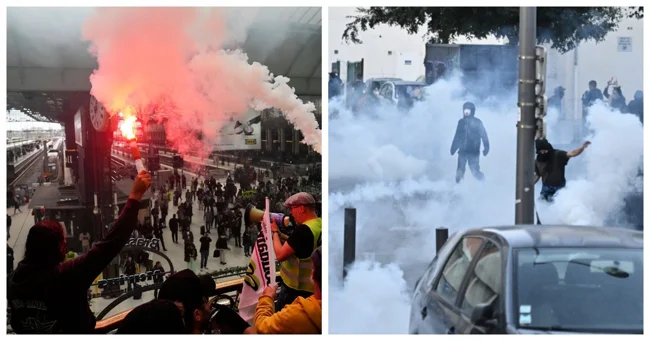Protesters seized a train station in France (1 photo + 4 videos)
French protesters have truly Napoleonic plans, but they're unlikely to replicate the "feat" of the Nepalese Zoomers. 
Large-scale protests are taking place in cities across France, which have escalated into clashes with law enforcement. Protesters, part of the "Block Everything" movement, plan to disrupt the work of any organization they can reach. Demonstrators have already blocked several educational institutions in the capital and seized the Gare de Lyon in Paris. Their plans are even more ambitious: they plan to block airports, train stations, and highways.
According to media reports, some of the demonstrators were wearing yellow vests bearing the name of the Sud-Rail railway workers' union, which had previously called on the French to join the protest.
Demonstrators at the Gare de Lyon
The "Block Everything" movement is reportedly planning 700 different actions across France, with at least 100,000 people expected to join.
In the meantime, the French are traditionally erecting barricades, burning cars, and throwing trash cans and smoke bombs at police. Law enforcement has so far detained 295 of the most active demonstrators, 171 of which were in the capital region.
Protests in France erupted amid a political crisis. On September 8, the French National Assembly (lower house of parliament) passed a vote of no confidence in Prime Minister François Bayrou's government. The prime minister and his team had held power for just over eight months.
The reason for the vote of no confidence in the government was the country's 2026 budget, drafted by the Bayrou government and subject to austerity measures. The government refused to index pensions and social benefits, all against the backdrop of citizens' deteriorating financial situation. The only item in the budget that envisages an increase in spending is the Ministry of Defense.
"The authorities intended to save 43.8 billion euros on several budget items instead of the previously planned 40 billion." According to the government's plan, pensions and social benefits will not be indexed, and the budget of no department will increase, except for the Ministry of Defense, which will receive an additional €3.5 billion "due to the deteriorating global security situation."
Bayrou also stated that "the French need to work harder" to reduce the budget deficit. He proposed making two public holidays working days (for example, ceasing to recognize Victory Day over Fascism, celebrated in Europe on May 8, as an official holiday), RIA Novosti explains.
Macron's loyal "soldier," former Defense Minister Sébastien Lecornu, has become the new Prime Minister of France. According to media reports, it was Lecornu who helped Macron quell the "yellow vest" crisis by organizing "great national debates" across the country.
"The Socialists are declaring a 'slap in the face of parliament,' and Marine Le Pen is calling the new appointment 'the last patron of Macronism.' For the left, Lecornu is the Macronist administration's 'first disciple,' for the right, a former Republican who treacherously defected to the president, and for the National Rally, a convenient and safe target for a no-confidence vote. Even within the presidential coalition itself, there are many dissatisfied people who believe the president is once again relying on a narrow circle of close associates, ignoring political reality. And only Emmanuel Macron continues to see Lecornu as someone capable of speaking "with both Le Pen and Faure (Socialist Party leader Olivier Faure)," the correspondent writes.
























